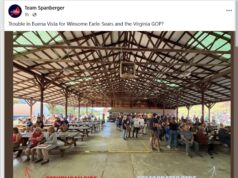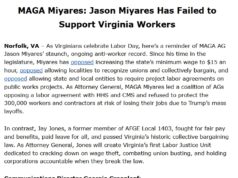I was chatting yesterday afternoon with a Virginia General Assembly legislative aide about “proffers” – something I knew basically nothing about prior to the past few days – and the person said something to me that I found striking: that the issue of “proffers” could end up being the “sleeper issue of the 2016 Virginia General Assembly.”
What are “proffers,” you ask, and why should you (or anyone else, for that matter) care? For more on that, see Sunday’s Washington Post story, Va. bills seek to weaken land-use tool behind new roads, parks and schools; the Richmond Times-Dispatch story, Proffer reform bill advances as Richmond-area localities fight to stop it; and yesterday’s Washington Post story, Va. Senate postpones vote on reforms to development proffers. Also see HB 770 Conditional zoning; provisions applicable to all rezoning proffers, definitions. and S.B. 549. A BILL to amend the Code of Virginia by adding a section numbered 15.2-2303.4, relating to conditional zoning. Here are a few key points from the news stories:
*The measures “are generating strong opposition from local officials in Northern Virginia, where development deals have helped shape the character of some of the region’s fastest-growing communities,” with “Fairfax, Loudoun and Prince William county officials say that changing the legislation would hamper their ability to negotiate for extra amenities from developers that, in the past, have been crucial to community support for new housing in places like Merrifield or Woodbridge.”
*On the other hand, J.M. Snell, president of the Home Builders of Virginia trade group, says that proffers have “grown out of proportion to where now localities have already predetermined proffers, which become demands, which is exactly the opposite of the word ‘proffer.’”
*”Critics of the bill have said it would diminish local input in the planning process, while supporters say it will help remove a barrier to affordable housing and the recovery of residential real estate in high-growth areas of Virginia.”
I also chatted with a bunch of elected officials to try and get some clarity on this complicated, important issue. Here are a few things I heard.
*Over and over again, I heard variants of, “It’s a VERY complex bill” (and “The devil is in the details”), one which could still undergo significant revisions in conference committee.
*One progressive elected official told me, “I’m for proffers because I think developers should pay for the costs of their development. But this bill still allows ‘reasonable’ proffers for transportation, schools, sewers, etc. It doesn’t allow for libraries and the arts, which are more amorphous costs for an increased population.”
*Another progressive elected told me, “This is an anti-sprawl bill and that’s why the exurbs are against it. By limiting the use of proffers is mostly related to infrastructure that will encourage developers to develop in areas that already have the infrastructure to keep the proffer cost down.”
*A progressive elected told me, “I am convinced the system needs fixing, though in a perfect world we would have had a proper study and taken the time to craft a much better piece of legislation. Also, “this bill is really targeting counties like Prince William County that charge developers upwards of $50,000 a unit and make housing unaffordable. I think that the counties now are making a mountain out of a mole hill. They already have tools in their toolbox they’re not using like affordable housing dwelling ordinances and neighborhood design guidelines that would take care of a lot of their concerns. Furthermore, most of what we want in with Virginia’s exempt. In other words infrastructure improvements next to redevelopment are OK sidewalks Road bus metro stations schools etc. if the development creates more students. This might even get Fairfax County to get off the side and put its Metro stations on the plan.”
*Yet another progressive legislator told me that “misleading information was circulating suggesting Fairfax County was OK with the bill as amended. Some believed it was OK as it left the House – others understood that the bill was still a work in progress and that it had improved but localities and the environmental community still had concerns.”
*A local official told me, “fundamentally this bill is a restriction on local government. As such, some local government leaders oppose it on principle, and some think it would actually make it easier for developers to do what they want and harder for localities to regulate them. Some leaders either think their own localities would be fine with it, or they’ve received assurance the Senate will ‘fix’ the problems.”
*Finally, yet ANOTHER progressive elected told me, “The proffer system is out of control and has been used as an excuse to not raise taxes. ALL of [the localities] are against [the legislation]. They’d rather tax new homes/condos than raise taxes.”
The bottom line: this is an important, complicated issue, with the legislation addressing it having potentially far-reaching ramifications on localities, developers, property values, growth patterns, you name it. Yet how many people know much about “proffers?” How much time and attention is available to focus on legislation addressing these issues? If this isn’t an argument for longer General Assembly sessions and much larger professional staffs, I don’t know what is…






![Monday News: Trump’s Lunacy Pushes China, Russia, India, etc. Together; “Happy Labor Day. Donald Trump and Elon Musk Are Screwing Workers.”; “Where is the [media’s] intense focus on Trump’s failing health?”; ““Trump says he is not a dictator. Isn’t he?”](https://bluevirginia.us/wp-content/uploads/2025/09/montage0901-238x178.jpg)








![Monday News: Trump’s Lunacy Pushes China, Russia, India, etc. Together; “Happy Labor Day. Donald Trump and Elon Musk Are Screwing Workers.”; “Where is the [media’s] intense focus on Trump’s failing health?”; ““Trump says he is not a dictator. Isn’t he?”](https://bluevirginia.us/wp-content/uploads/2025/09/montage0901-100x75.jpg)